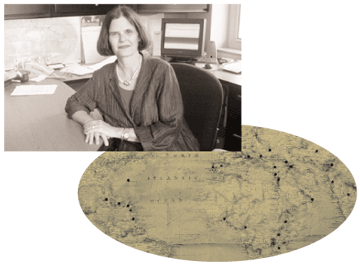
An
ambitious agenda
The
Lillian Carter Center for International Nursing gets down to business
with a historic forum on the global workforce
By Pam Auchmutey
This
is the first-ever opportunity for government chief nursing officers
and national nursing association leaders to share information, questions,
and problems, and have them addressed by human resource directors and
nursing workforce researchers and scholars. They will be able to go back
to their homes with a plan of action.—Dean Marla Salmon

The
Lillian Carter Center for International Nursing gained a host of new colleagues
when Marla Salmon met with nursing leaders from the Newly Independent
States during the International Council of Nurses congress
in Copenhagen.
Lillian Carter was
never one to shy away from helping people or trying new experiences. The
same can be said about the new center in the School of Nursing that bears
her name. Now in its first year, the Lillian Carter Center for International
Nursing (LCCIN) embodies her spirit as a compassionate nurse and volunteer
and the school’s mission to advance health through effective nursing
services worldwide.
The new center is also grounded in the school’s expertise in nursing
workforce issues and its special relationship with The Carter Center,
which has several international health programs. This fall, the LCCIN
takes an ambitious step with its first forum and conference on “Global
Nursing Partnerships: Strategies for a Sustainable Nursing Workforce.”
Come mid-October, 300 top nursing leaders from more than 50 countries
will gather in Atlanta as former US President Jimmy Carter dedicates the
LCCIN in honor of his late mother. Just as important, the forum will give
nursing leaders a chance to roll up their sleeves and build partnerships
and learn new strategies to strengthen the nursing workforce and health
care system in their respective countries. In particular, this year’s
forum and conference targets groups of nursing leaders who have never
come together until now.
“This is the first-ever opportunity for government chief nursing
officers (CNOs) and national nursing association (NNA) leaders to share
information, questions, and problems, and have them addressed by human
resource directors and nursing workforce researchers and scholars,”
says Dean Marla Salmon, director of the LCCIN. “They will be able
to go back to their homes with a plan of action to address policy needs
and future research, based on strengthened alliances within their countries.”
Nursing history in the making
For years, government CNOs have sought opportunities to address global
workforce issues. The idea for a global forum grew out of Salmon’s
longtime involvement with the International Council of Nurses (ICN), the
World Health
Organization’s Global Advisory Group on Nursing and Midwifery, which
she chaired until recently, and the Division of Nursing in the US Department
of Health and Human Services, which she previously directed while serving
as the nation’s chief nursing officer. Two years ago, at the ICN
congress in London, Salmon was asked to host a global forum in conjunction
with international nursing work under way at Emory. In developing a strategy
to bring CNOs together, Salmon and other leaders realized that a crisis
in the nursing workforce was emerging nationally and globally. They also
determined that partnerships involving nursing and health system leaders
were essential in developing research and planning efforts to sustain
a global nursing workforce. Subsequently, a core planning committee was
formed comprised of people with knowledge of workforce issues in a global
context, experience as a CNO or NNA leader, scientific expertise in workforce
planning, and a global perspective on health issues and trends related
to nursing and midwifery.
“The nursing and midwifery professions are crucial elements in all
health care provider teams, yet their effectiveness and contributions
are being undermined by a lack of capacity and support within their own
countries,” Salmon explains. “Chief nursing officers, national
nursing associations, and health system planners play key roles in the
development of nursing and midwifery workforces and are uniquely positioned
to address these human resource issues. It’s essential to provide
opportunities for them to learn together and support each other.”
Earlier this year, LCCIN staff surveyed CNOs in nearly 90 countries to
discover the leadership and workforce issues they had in common. High
on their list were nursing shortages, workforce issues, changes in the
health care system, and education of nurses and midwives. The LCCIN shared
these findings with CNOs at this year’s ICN congress in Copenhagen
to get further input in planning the forum. While in Copenhagen, Salmon
also met with nurse leaders from the Newly Independent States, enabling
the LCCIN to form new bonds with nurses in Eastern Europe.
“There were thousands of nurses from around the world at the ICN
congress, and many of them helped us see how our plans were fitting together,”
says Kathryn Kite, LCCIN administrative director and chief organizer of
the forum. “We heard our survey was right on target.”
As its planners note, the forum is both historic and timely. No global
assessment of the nursing workforce exists. National and regional approaches
to workforce issues vary in methodology, data collection, analytical techniques,
and ability to form evidence-based policy recommendations. And few opportunities
exist for strengthening relationships between the government and the private
sector in nursing.
“Nursing recruitment and migration are critical political, economic,
and health issues for most nations today,” says Salmon. “If
nursing is to have a strong presence nationally, strong strategic relationships
are needed. The LCCIN forum can help national nurse leaders achieve that.”
Global Partners for
a Sustainable Nursing Workforce
The
following partners have worked closely with the Lillian Carter Center
for International Nursing to plan its first global forum.
• The World Health Organization
• The International Council of Nurses
• The Commonwealth Health Ministers Steering Committee for Nursing
& Midwifery
• The Chief Nurse for the Government of the United Kingdom of Great
Britain and Northern Ireland
• The Chief Nurse of the Government of Canada
• The Carter Presidential Center
• The Director of the Division of Nursing, Bureau of Health Professions
and Health Resources and Services Administration, US Department of Health
and Human Services